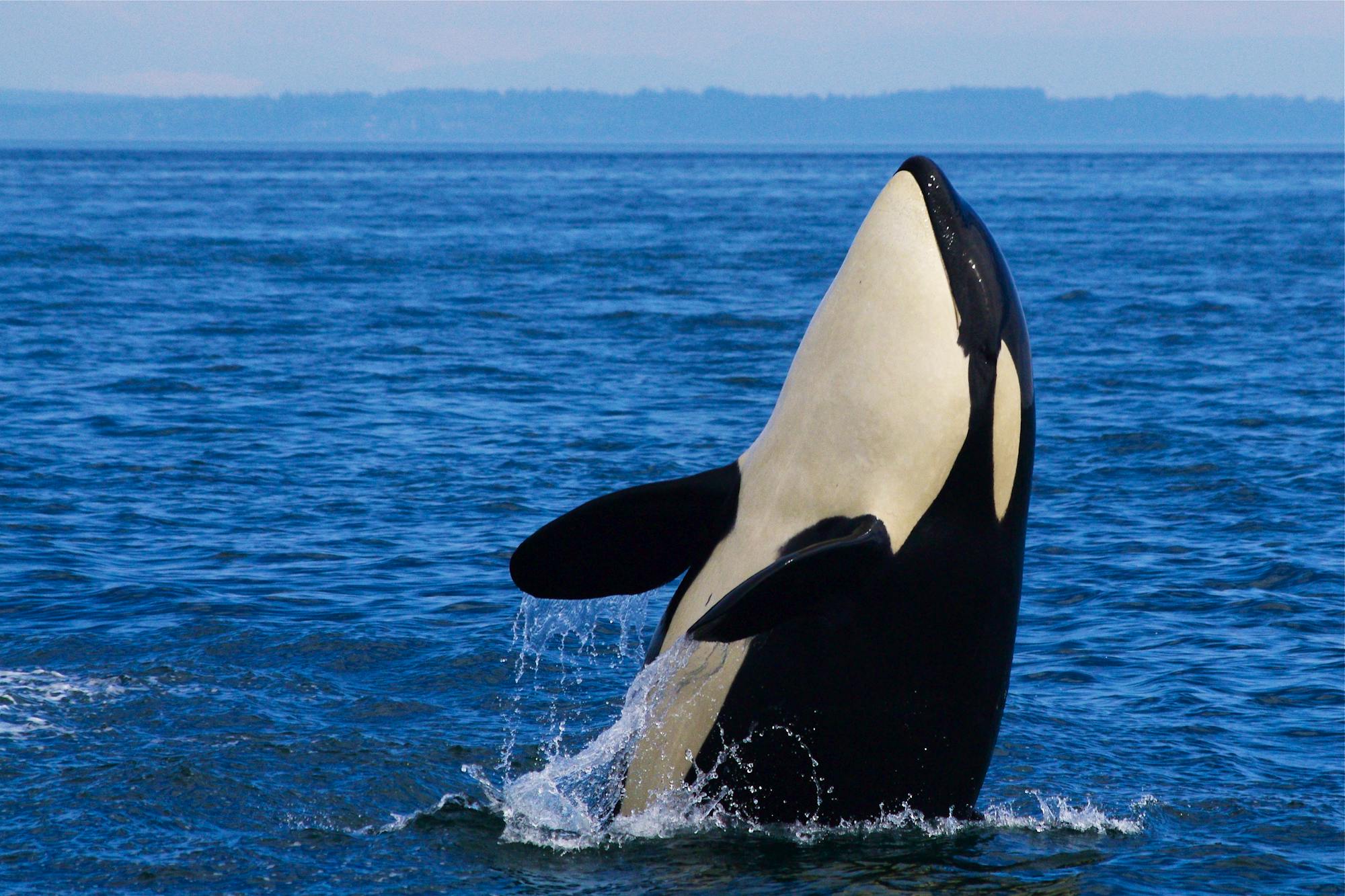Every June for the last 14 years, people throughout the Pacific Northwest celebrate Orca Month to highlight the southern resident orcas: a unique salmon-eating population that ranges from Monterey Bay in California up to Vancouver Island in Canada and throughout the Salish Sea (which includes the Puget Sound).
Sadly, these orcas are some of the most endangered wildlife in the United States, with only 72 individuals left. Every year, the population slips closer to extinction. If we’re going to save these orcas, we need people to act! Here are the top 10 things you can do to help southern resident orcas:
- Reduce your stormwater footprint. Every time it rains, the water hitting our streets, buildings, and lawns washes all the chemicals and pollution on these surfaces into our storm drains. This includes oil from our cars, chemicals we spray on lawns and pet waste we don’t pick up. This toxic soup, called stormwater runoff, flows directly into local creeks and rivers, eventually reaching the ocean. Stormwater runoff is the biggest source of pollution in the Salish Sea, and it has a big impact on wildlife, especially southern resident orcas. You can reduce stormwater runoff by doing simple things, like fix leaking cars, going chemical-free in your yard and garden, and picking up after your pets. When it’s time to wash your car, either take it to a commercial car wash or wash your car on your lawn so soap, oil and other pollutants don’t wash off cars directly into storm drains.
- Plant a raingarden. If you’re a homeowner, you can go one step further by planting a raingarden. Raingardens are bowl-shaped landscaping features that are designed to capture and filter stormwater runoff. If you have space in your yard, consider planting a raingarden to collect runoff from your roof.
- Cut back on plastic. Plastic is polluting our oceans and making food chains even more toxic. Cutting back on your use of plastic will help all marine wildlife. Some easy ways to cut back on plastic include carrying reusable bags, straws, cups and bottles with you wherever you go so you’re not caught out needing to use plastic if you stop for a few groceries or coffee. You can also eliminate plastic from your bathroom with bamboo toothbrushes, bars of soap (instead of body wash) and reusable razors. And with a little research, you can find companies that cut down on plastic packaging for cleaning products, kitchen supplies, clothing and more.
- Reduce your carbon footprint. Climate change is the greatest threat to wildlife worldwide, including southern resident orcas. As the climate warms, water temperatures in rivers increase to lethal levels for salmon. We can help cool rivers through habitat and river restoration efforts, but we also must reduce the amount of carbon dioxide going into the atmosphere.
- Volunteer to help with local beach and river clean ups and habitat-restoration projects. Restoring salmon habitat can provide more fish for orcas.
- Go whale-watching from shore. Many people come to Washington to go whale-watching, but you don’t need to get on a boat to see the whales. Underwater noise from boats can disrupt the orcas’ echolocation, making it harder for them to find salmon. By sticking to shore, you can still enjoy seeing the whales without disturbing them. Find some of the best places in western Washington to go whale-watching from the shore by clicking this link.
- Take action and ask Washington’s leaders to restore the lower Snake River. Leading orca and salmon scientists say that if we remove four large dams on the lower Snake River, we can restore 1 million more adult salmon. This would provide an important source of food for the southern residents, and many scientists believe if we don’t remove these dams, we may not be able to save these orcas from extinction. Take action and ask Washington’s elected leaders to develop a plan that restores the lower Snake River and its salmon.
- Call your members of Congress and ask them to support funding for Puget Sound recovery. Congress plans to pass a big economic stimulus bill that puts people back to work. Tell your representatives that Puget Sound recovery supports economic recovery. Habitat projects create restoration jobs, and a healthy Puget Sound supports local economies throughout the Washington. Click here to call you member of Congress.
- Write a letter to the editor about orcas. You can inspire others to also take action for orcas by writing a letter to the editor. This is a great way to share information with your community and elected officials about orcas and how we can all help them.
- Learn more about orcas. Dive deeper and learn more about the southern residents and the threats they face by exploring our story map. Make sure to join our NW Facebook group to get the latest on what’s happening with the southern residents and how you can help!
Whether you do one of these actions or all 10, everyone can do something this Orca Month and in the months that follow to help the southern resident orcas. Thanks for taking action, and happy Orca Month!









